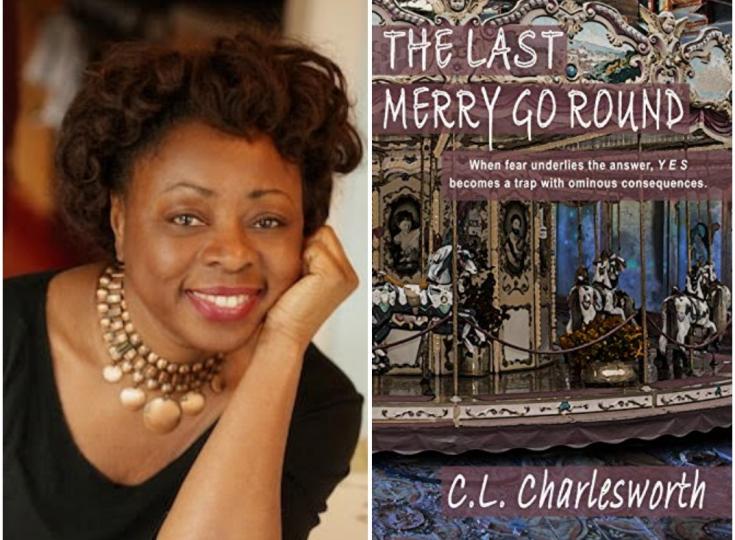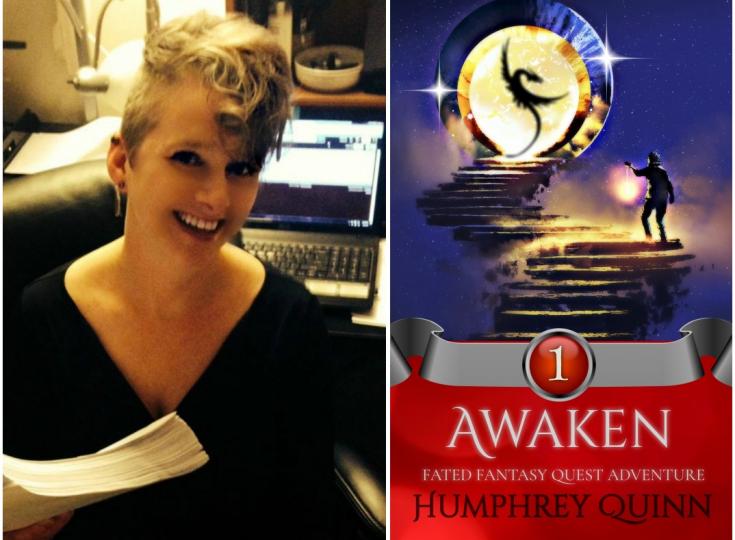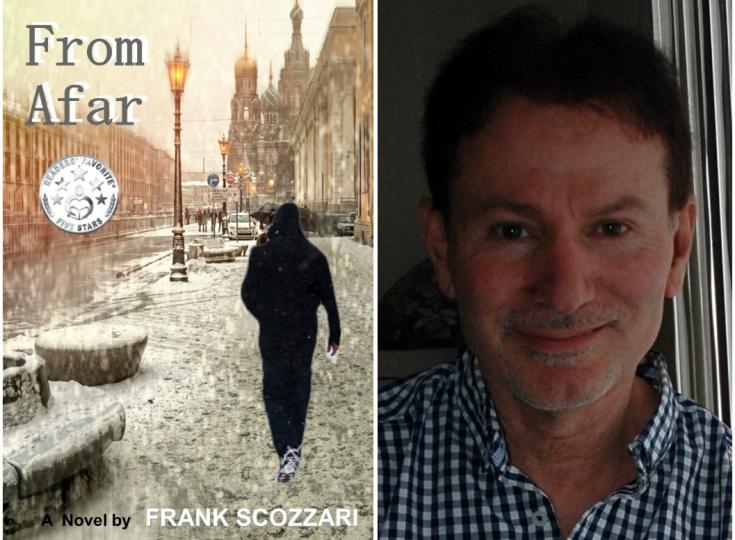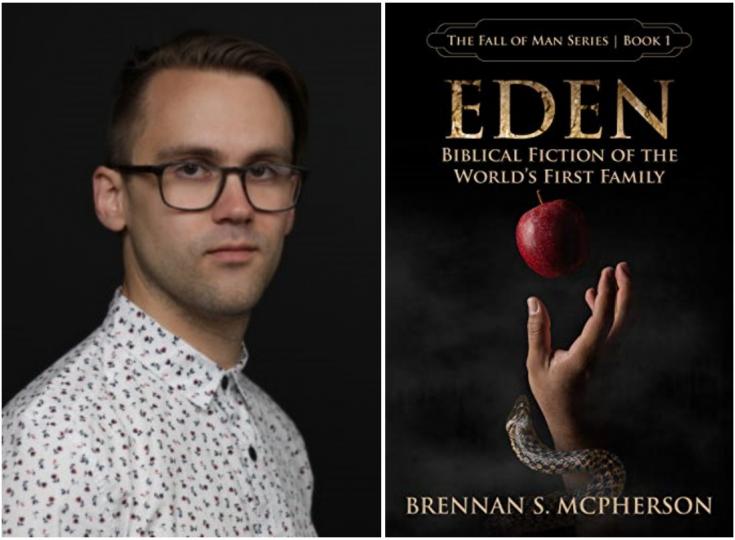K. Adams - Infidelity and Cultural Variables in a Fast-paced Mystery Thriller
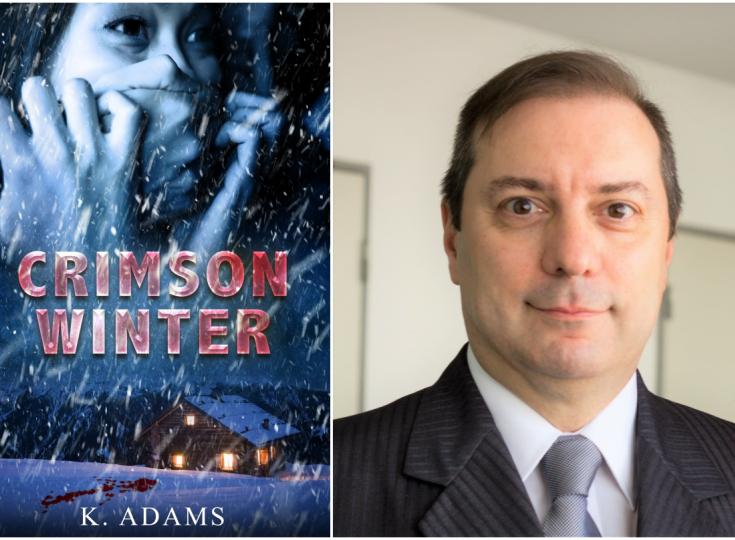
K. Adams is a lawyer and, most importantly, a happy husband and father (one son, and a baby boy on his way). Crimson Winter is his debut novel, a thriller with an underlying message: the value of women's empowerment. As our Author of the Day, he tells us all about this book.
Please give us a short introduction to what Crimson Winter is about.
The novel is about Lucy Wang, a Chinese-Canadian woman in her forties whose idyllic world is shattered when she discovers that her husband Patrick Harris, an entrepreneurial millionaire, is having a passionate affair with an unknown woman. When Lucy learns of a new and unconventional approach to tackle the problem that is unknown in the West but practiced in China, she decides to go for it, ignoring that she’s risking much more than the future of her marriage.
What inspired you to write about a woman in her forties who discovers that her husband is having an affair?
A few years ago, I read an article about the proliferation in China of agencies that provide what they call a “mistress-dispelling service,” that is, ending affairs between married men and their extramarital lovers. Hired by scorned, typically rich wives, these agencies turn to the most varied methods (some claim to have up to “33 different procedures”) to induce the mistress to disappear. Immediately, I thought that would be a good starting point for developing an interesting story. And I guess it is indeed, to the point that many of the readers of “Crimson Winter” believe I made up these agencies for the novel!
This is your debut novel. What has the experience been like so far?
I had previously published a few books and dozens of articles on legal issues, but I had never before undertaken the task of writing fiction, despite the fact that numerous readers of my legal production praised my prose, in some cases over the technical content of the material (I never knew if I should feel happy or sorry about that, but it’s always comforting to know that readers enjoy what you write, whatever it is).
It was about fifteen years ago when I started drafting various fiction manuscripts, but they never got beyond a few chapters (due to my job requirements, time was always scarce). In 2017 I devoted myself to this matter with more determination, and then I realized that the novel I had in mind had to be transformed entirely. I started a completely new one, but once again my job and some health problems put a halt to my work. Finally, it was only at the beginning of 2019 that I was able to resume working with some continuity, which, fortunately, I haven’t abandoned since. The greatest lesson I’ve learned during the process was that such a task requires not only time, but also patience, a great deal of humility to recognize one’s own mistakes, and enormous doses of tolerance for frustrations. During the last years, this story experienced an incredible metamorphosis, which I didn’t expect. I can’t remember how many times the plot underwent fundamental changes or how many characters disappeared or were incorporated into it, and I now have more than a dozen of complete manuscripts that at the time I considered “definitive.” But when you think of yourself as a writer, very few things can compare to the enormous pleasure of having your book finished and published!
Tell us more about Lucy Wang. What makes her tick?
Lucy and her elder sister are of Chinese descent. They were born in Canada to parents they never got to know. They were fortunate, however, to be raised by adoptive parents who provided them with a solid education and, most importantly, a lot of love. Lucy was at ease in her roles as exemplary daughter and later as devoted wife. She imagined herself as a happy housewife and mother of a family for the rest of her life. She wasn’t even interested in taking part in managing her husband's multi-million-dollar oil company, despite being overqualified to do so thanks to her academic accomplishments.
The setbacks begin with her difficulty conceiving a child, followed by the discovery of her husband's infidelity, something she never imagined was possible. Her entire life appears to be falling apart, and the situation overwhelms her. She then by chance discovers the existence of these agencies and, immersed in a sea of uncertainty, she agrees to carry out a plan to make the lover disappear. However, this demands efforts from Lucy that will take a heavy emotional toll on her, such as pretending to her husband that she doesn’t know about his affair (and acting accordingly!), and just waiting for the results. Both situations are emotionally draining for her. When the plan starts to go wrong, she faces a crucial decision: either play her cards all the way to the end or abandon her husband, her still-unrealized project of motherhood, and, ultimately, the ideal life she had imagined next to Patrick. To win this game she must, to her chagrin, "break the mold" and look inside herself for a new Lucy, who has to be quite different from the old one. It is a path that, if taken, will lead to her becoming an empowered woman. The problem is that she isn't convinced she wants to go through with it. It will be by far the most critical decision of her life.
You are a lawyer. How has this influenced your writing?
Not much, really. Only when it became necessary to deal with some legal aspects of Lucy's husband’s business. For the rest, when I write, I identify with myself as a reader; I write what I like to read, and I make an effort to write what I believe the public who is like me is waiting for. But this is not a marketing strategy; I do it with the sole objective of having readers enjoy reading the novel as much as I enjoyed writing it.
Besides writing, what other secret skills do you have?
I'm not sure if I have any extra skills, let alone secret... What I can mention is that I also write fluently in Spanish (some say better than in English), since it’s my mother tongue. I can tell you that I’m a history buff, particularly of American history, and I enjoy trivia TV shows. And of course, I love reading. Some of my favorite books are The Grapes of Wrath, To Kill a Mockingbird—not surprisingly, given my profession—The Catcher in the Rye (it doesn’t amaze me that an average of 700 copies of this book are still sold every day around the world, more than 70 years after its first publication), Patricia Highsmith's novels, and Ambrose Bierce's short stories, among others.
Interesting cover. Please tell us more about how it came about.
Thank you very much, but I must share that compliment with the designer, Brandie Doane McCann. The plan was to gather a set of images that would represent the main ingredients of the novel and, of course, raise the potential readers’ interest on it. To begin with, I pointed out to Brandie a series of elements that I judged must be present, such as the cabin, the snowstorm, the trail of blood, and some others that her good judgment rightly ruled out. As for the image of Lucy on the cover, it was the result of a personal search through material made available to me by the designer. I was fortunate to find one that really pictured the thrill I was looking for.
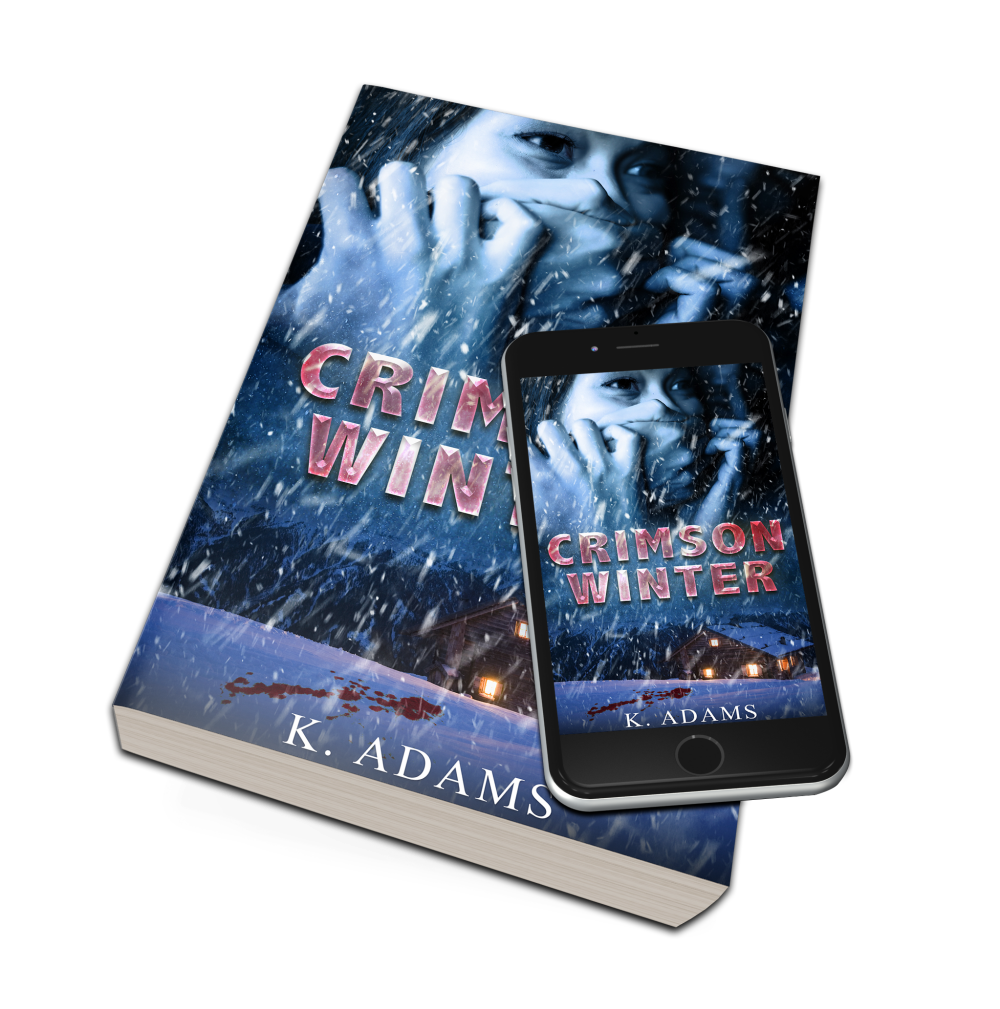
Did you plan out the entire plot before you started writing, or did some of it just "happen" along the way?
As I mentioned, at first what I had was just the "triggering idea," in which I did have faith. But that was all, so I had to create an entire universe around it. As a result, the plot, the characters, and the intrigue began to emerge, and the story evolved as I wrote it. As befits a lawyer, I’m methodical and orderly in many aspects, but this was not the case with the plot's development. I wasn’t able to commit to a single structure, and I drew up numerous schemes that changed over time. I intend to begin my next novel with a much more fleshed-out skeleton.
Why did you title this "Crimson Winter"?
Choosing the appropriate title for a novel is almost always an arduous task. When once asked about choosing titles, Hemingway said, “I make a list of titles after I’ve finished the story or the book—sometimes as many as one hundred. Then I start eliminating them, sometimes all of them.”
Of course, without attempting any comparison of myself to such genius, I have also had to discard several titles. The formula? I stick to the basics: a title that is short, easy to remember and to pronounce, and relevant to the story. In this last regard, “winter” makes reference not only to the period of the year in which the action occurs but also to the climate that pervades almost all of it, as well as to the specific scenario in which the outcome takes place. The years I spent enjoying (yes, you read correctly) Montreal's harsh winters provided me with first-hand knowledge that allowed me to create the framework in which the story's climax takes place. “Crimson,” for its part, makes a direct reference to the tone that runs throughout the novel, which I believe is sufficient to say, since I don't want to spoil it here.
What was your greatest challenge when writing this story?
Writing good fiction presents numerous challenges to the author, such as developing interesting and believable characters and, if possible, keeping the reader's interest alive on every page. Having said that, I can tell you that this novel posed a specific challenge: to accurately represent aspects of a culture that is not the author's own. Of course, I didn't start from scratch (that would have been an almost impossible task), because I already had some knowledge of China and its culture. In fact, the places I describe in "Crimson Winter" are places I've visited in person, and I’ve been a witness to or protagonist in several stories I tell there (for example, the one about the woman who drives the barge in the West Lake, an anecdote I will never forget). But that certainly wasn't enough, so I turned to Chinese friends of mine both in China and Canada, who generously answered my queries and advised me on a variety of issues (they are identified in the “Acknowledgments” section at the end of the book). I believe this challenge has been met thanks to their input.
Lucy has a lot of internal conflicts - why did you create her this way?
The multiplicity of Lucy's conflicts, both within herself and with the reality that surrounds her, is the driving force behind this story. Internal conflict is something that we all experience at some point in our lives, and the conflicts depicted in “Crimson Winter,” however complex they may appear in fiction, are also a reflection of situations that afflict many people in real life.
In the first versions of this novel (which were several), Lucy remained more as an “angelic character” for most of the story, almost until the end of it. But it was thanks to my beta readers that I quickly realized such an approach lacked appeal. And they certainly weren’t wrong: I recall a piece of advice repeated in all the literary workshops I attended, as well as in the classic books that "teach" how to write: the main character must suffer a lot, and the author must torture him/her mercilessly. And I consider myself a good student...
Do you have any interesting writing habits? What is an average writing day like for you?
I don't think I have any writing habits that are noteworthy for their uniqueness. But when I'm committed to a project, I’m determined to write every day (for intellectual activities, I am more productive in the second half of the day and at night). I also endeavor to strictly follow Stephen King's advice: If you want to be a writer, you must do two things above all others: read a lot and write a lot. There’s no way around these two things that I’m aware of, no shortcut.
What are you working on right now?
I have several writing projects in mind. After finishing reading "Crimson Winter," you’ve surely realized that the main one is a continuation of this story, for “Crimson Winter” is intended to be the first installment of a series (ideally, three books). Many readers have told me that they’re already looking forward to the next book, which of course flatters me and places a great responsibility upon my shoulders at the same time.
I would also like to write a story in which the protagonist is a woman who must face challenges that push her to the limits and, at first, appear to overwhelm her completely, albeit with an entirely different theme and setting than "Crimson Winter." The only thing they will have in common is the underlying theme of female empowerment.
Finally, I'm about halfway through a collection of stories that could be labeled as "grim."
Where can our readers discover more of your work or interact with you?
I look forward for all of you to visit my Amazon author page and follow me at: https://www.amazon.com/author/ken.adams, and I would especially love it if you would leave a book review at: http://www.amazon.com/review/create-review?&asin=B09YM8S9JZ
Is there anything else that you would like to add?
It is said that editors are essential to authors because it’s almost impossible to be objective about one’s own work, and I can’t agree more on this assertion. It is also unnecessary to emphasis the importance of impeccable proofreading work. I was extremely fortunate to have the assistance of Allister Thompson and Britanie Wilson as editor and proofreader, respectively. It would take me several paragraphs to explain how much I owe them, but you can read about it in the “Acknowledgments” section in my novel.

Lucy's crystal castle cracks when she discovers that her husband, an entrepreneurial millionaire, is having a passionate affair with an unknown woman. After learning of an unconventional new approach to tackle the problem, she decides to go for it, ignoring that she's risking much more than the future of her marriage.
